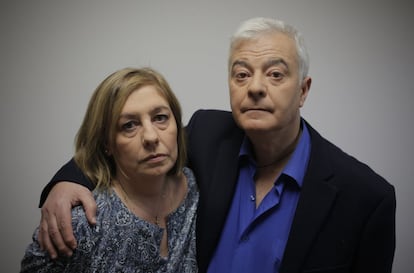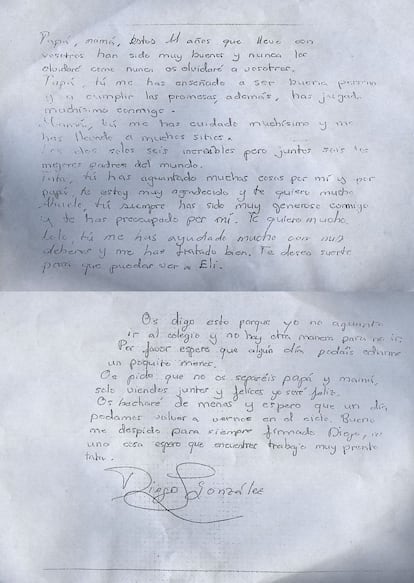Madrid to revise case of 11-year-old’s suicide after note points to bullying
“I can’t stand going to school and there is no other way not to go,” Diego told his parents

The parents of an 11-year-old boy who killed himself by jumping from the window of the family’s fifth-floor apartment in Madrid are hoping his moving suicide note will convince the courts to reopen the case.
“I will never forget you,” Diego wrote to his mother Carmen González, 52, and father Manuel González, 57, before ending his life on October 14 of last year. He also dedicated words to his grandfather, uncle and half-brother, before explaining: “I am telling you this because I cannot stand going to school and there is no other way not to go.”
A court closed the case after it was unable to determine if third parties had been involved in the boy’s death
Diego’s parents believe the note shows that school bullying may have been to blame for their son deciding to take his own life and are calling for the case to be reopened, according to sources.
A court in the Madrid satellite town of Leganés closed the investigation in December after it was unable to determine if third parties had been involved in the boy’s death.
In their own investigation, Madrid school inspectors had previously ruled out bullying as the cause but are now set to review the case after the parents made the letter public in Spanish daily El Mundo this week.
During their initial inquiry, inspectors failed to speak to the family because, a regional education department spokesman explained, their work is “confined to the school environment unless the parents file a complaint.”
Madrid regional premier Cristina Cifuentes is now set to meet Carmen and Manuel González, while the education department is not ruling out a new investigation.
“I ask you not to split up, mum and dad, only seeing you together and happy will I be happy,” Diego wrote
The couple had no evidence to prove that their son was being bullied. Carmen González recalled this week that Diego had been very anxious for several months and had not wanted to go to school. The day before he died he came out of school looking “very pale,” but she had been unable to get anything out of him, she said.
Diego was an “intelligent, very special and very affectionate” child, she added.
“Mum, Dad, these 11 years I have spent with you have been very good and I will never forget them as I will never forget you,” he wrote to his parents. “Alone the two of you are incredible, but together you are the best parents in the world. […] I ask you not to split up, Mum and Dad, only seeing you together and happy will I be happy. I will miss you and I hope that one day we will be able to see each other again.”
School inspectors failed to speak to the family during their initial inquiry into Diego’s death
The family’s lawyer, Robinson Guerrero, says that more than a dozen parents from the Catholic public-private school that Diego attended have been in contact to tell them about “other cases.”
“With a matter as serious as the suicide of a minor, the investigation has to be followed through to the end,” he said.
“We want the truth to come out,” added Manuel González.
Mariano Cano is one of the parents who runs the Nuestra Señora de Los Ángeles school in the Madrid working-class district of Villaverde: “We are shocked and shaken,” he said. “We have not detected even the slightest sign of bullying, nor was there any problem with this boy. From the beginning, we have been in contact with the family and are collaborating with the police investigation and the education department.”
English version by Nick Funnell.

Tu suscripción se está usando en otro dispositivo
¿Quieres añadir otro usuario a tu suscripción?
Si continúas leyendo en este dispositivo, no se podrá leer en el otro.
FlechaTu suscripción se está usando en otro dispositivo y solo puedes acceder a EL PAÍS desde un dispositivo a la vez.
Si quieres compartir tu cuenta, cambia tu suscripción a la modalidad Premium, así podrás añadir otro usuario. Cada uno accederá con su propia cuenta de email, lo que os permitirá personalizar vuestra experiencia en EL PAÍS.
¿Tienes una suscripción de empresa? Accede aquí para contratar más cuentas.
En el caso de no saber quién está usando tu cuenta, te recomendamos cambiar tu contraseña aquí.
Si decides continuar compartiendo tu cuenta, este mensaje se mostrará en tu dispositivo y en el de la otra persona que está usando tu cuenta de forma indefinida, afectando a tu experiencia de lectura. Puedes consultar aquí los términos y condiciones de la suscripción digital.









































